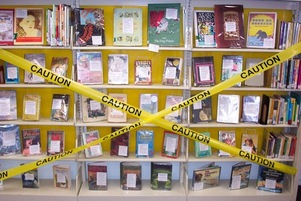 Jessica Dorcelien Editor-in-Chief Each year, the American Language Association’s (ALA) Office of Intellectual Freedom collects information from newspapers and individually submitted reports to compose a list of the top ten most frequently challenged books. From 2000 to 2009, there were roughly 5,099 challenges reported to the Office of Intellectual Freedom. Majority of the challenges were due to their “sexually explicit” material and “offensive language.” Other reasons included violence, homosexuality, Satanic themes, and religious viewpoints. Surprisingly, 119 of these challenged books were due to their depiction of an “anti-family” theme. Challenging a book is not simply making a statement that one does not agree with the views or themes of the particular novel; rather, challenging a book is an attempt to restrict its accessibility from other readers. Within this same decade, there were about two thousand challenges made to books that are readily accessible to students; of these two thousand, 114 challenges came from college classrooms. Taking these statistics into perspective, this means that at the college level, over one hundred students found the material that they were reading in their higher level classroom to be so obscene to the point that they thought it lacked literary merit. To an even further extent, they not only believed that the book was not worth reading, most-likely for one of the reasons listed above, but they felt the need to protect their peers by restricting them from the reading.
The two most frequently challenged books of 2015 are Looking for Alaska by John Green and Fifty Shades of Grey by E. L. James. According to Goodreads.com, Looking for Alaska received 4.1 stars while Fifty Shades of Grey received 3.7. Although both novels have been critiqued harshly and have become known for their more explicit themes, they have also received a lot of praise. The ideas and values of what are and what are not accepted by society are constantly (but not consistently) changing. What readers of the past had believed to be immensely vulgar, like 1984 by George Orwell, are now taught in the high school classrooms. Is it wrong to restrict other readers from learning about other perspectives, even if some may not disagree to the same extent? Comments are closed.
|
Archives
March 2017
Categories
All
|

